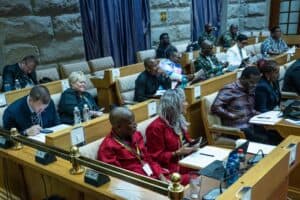In a briefing on the outcome of the Cabinet meeting yesterday, Minister in the Presidency Mondli Gungubele said government was committed to protecting whistleblowers, but that not everyone qualifies to be a one.

Those who blow the whistle on corruption could be facing the battle alone as there was little protection from threats, piling legal fees in court matters and limiting provisions of the Protected Disclosures Act.
The presidency has recently been vocal on the safety of whistleblowers following the execution-style murder of Gauteng health financial accounting chief Babita Deokaran, who spilled the beans on PPE corruption.
In a briefing on the outcome of the Cabinet meeting yesterday, Minister in the Presidency Mondli Gungubele said government was committed to protecting whistleblowers, but that not everyone qualifies to be one.
“The basic principle is that all those who have information to assist the state, the state is always committed to make sure they are protected. Where it is falling through the cracks, the government is always committed to correct that,” said Gungubele.
But according to experts, the minister’s statement did not seem to be entirely true. Instead, the onus was on the whistleblower to ensure they protect themselves, said high-profile whistleblower and former SA Revenue Service (Sars) executive Johann van Loggerenberg.
Should a whistleblower be harassed or receive threats, they would have to approach the courts for a protection order or an interdict.
“You have to prove that you are being harassed. It is not a simple matter. It is a legal process that the whistleblower needs to institute. You have to investigate and collect evidence and know who is harassing you and if you don’t know, you won’t be protected,” he said.
“The same applies in the Protection against Harassment Act. It must be instituted by the whistleblower. You will need a lawyer, an advocate, funds and evidence in order to convince the court.”
An alternative would be turning to the National Prosecuting Authority (NPA), but only if a docket on the matter is under investigation, said Accountability Now director advocate Paul Hoffman.
“You are on your own until such a time a docket has been considered by the NPA and you are regarded as a witness or a potential witness and may be in danger. At that point, they will put you and your family in a safe house somewhere, give you a different identity and try to keep you out of the sights of the baddies,” Hoffman said.
Despite the Protective Disclosure Act which provides procedures for an employee to disclose information relating to malpractice in the workplace and protection for such an employee, the Act had certain limitations.
“It defines a whistleblower as an employee, or a former employee, or someone like a contractor, which is limiting. It doesn’t say anything about what happens if your family may be harassed. It doesn’t think through the consequences for whistleblowers.”
Not only do whistleblowers face death threats, but the duty of reporting corruption comes with mental health issues, deep financial losses and even divorce.
Van Loggerenberg said he lost income to support his family, including his mother.
“All whistleblowers face common consequences. If we haven’t lost our jobs already, we lose them soon thereafter. We lose our income. In a matter of time, our savings run out,” he said.






